A Content Management System (CMS) helps you create and manage website content without coding. The right CMS can improve your site's loading speed, mobile responsiveness, and content organization - crucial for search engine optimization (SEO).
Here are the top 10 CO CMS for SEO in 2024:
Quick Comparison
| CMS | Page Speed | Mobile Friendly | Built-in SEO Tools | Customizable Metadata | XML Sitemap |
|---|---|---|---|---|---|
| WordPress | Average | Excellent | Yes (plugins) | Yes | Yes |
| Drupal | Fast | Excellent | Yes (modules) | Yes | Yes |
| HubSpot CMS | Fast | Excellent | Yes | Yes | Yes |
| Joomla | Average | Good | Yes (extensions) | Yes | Yes |
| Next.js | Very Fast | Excellent | Yes (plugins) | Yes | Yes |
| Webflow | Fast | Excellent | Yes | Yes | Yes |
| Wix | Fast | Excellent | Yes | Yes | Yes |
| Hygraph | Fast | Excellent | Yes | Yes | Yes |
| Shopify | Fast | Excellent | Yes (apps) | Yes | Yes |
| Storyblok | Fast | Excellent | Yes | Yes | Yes |
When choosing a CMS for SEO, consider factors like page speed, mobile-friendliness, built-in SEO tools, metadata customization, and XML sitemap generation. Evaluate your specific needs and resources to make an informed decision.
1. WordPress
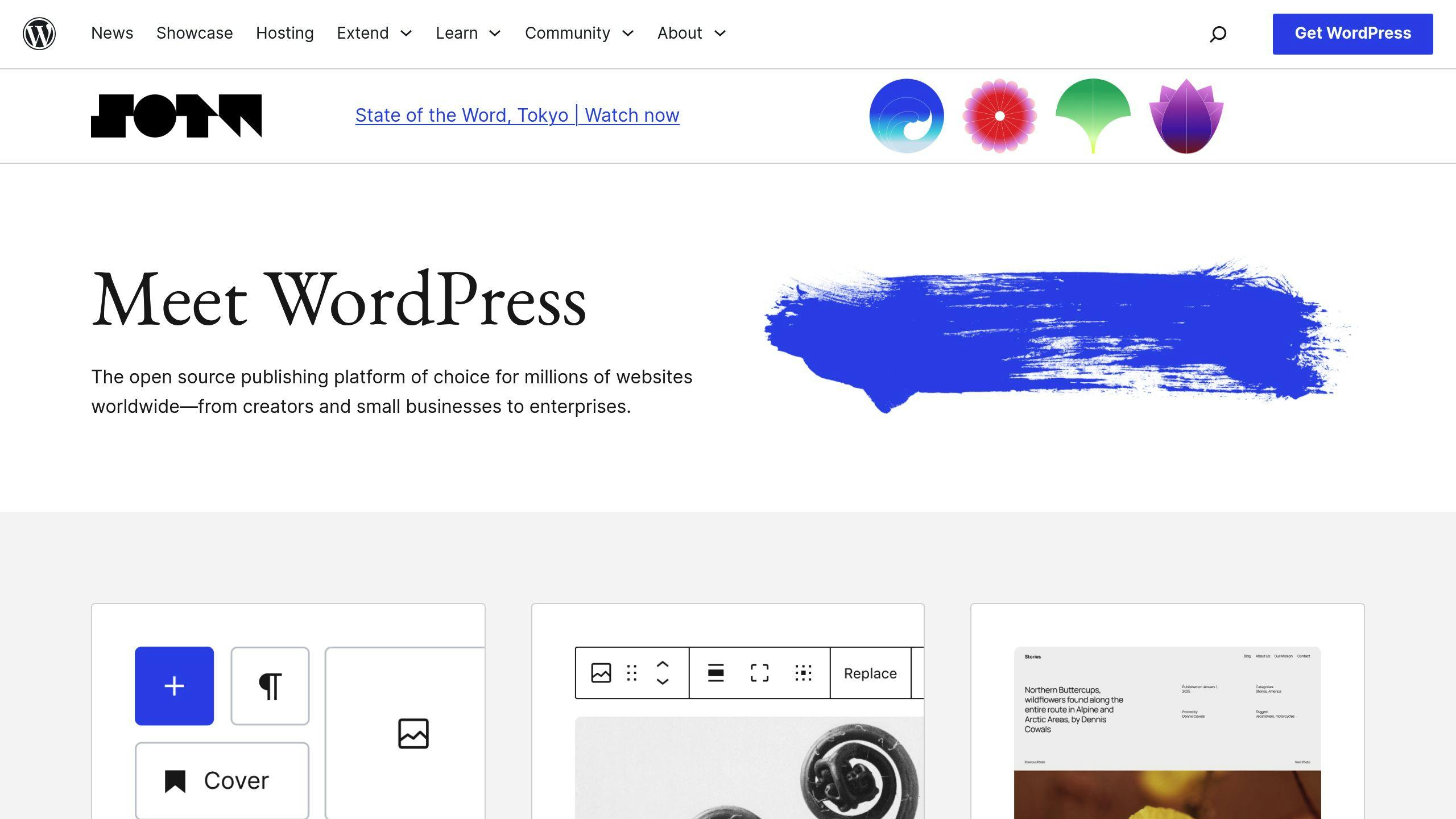
WordPress is the most popular Content Management System (CMS), used by over 36% of all websites. Its flexibility and user-friendly interface make it an ideal choice for SEO.
SEO Plugins and Apps
WordPress offers a wide range of SEO plugins, including:
| Plugin | Features |
|---|---|
| Yoast SEO | Keyword research, on-page optimization, technical SEO audits |
| All in One SEO Pack | Advanced SEO features, XML sitemap generation |
| Rank Math | Keyword research, on-page optimization, technical SEO audits |
These plugins help you optimize your website's metadata, generate XML sitemaps, and improve your website's loading speed.
Metadata Customization
WordPress allows you to customize your website's metadata, including:
- Title tags: Customize the title of your webpage
- Meta descriptions: Write a brief summary of your webpage
- Header tags: Organize your content with header tags (H1, H2, H3, etc.)
You can also add alt text to your images, making them more discoverable by search engines.
Page Load Speed
WordPress offers various caching plugins, including:
| Plugin | Features |
|---|---|
| W3 Total Cache | Improves page load speed, reduces server load |
| WP Super Cache | Generates static HTML files, reduces server load |
These plugins help improve your website's loading speed, which is essential for both user experience and SEO.
Mobile Responsiveness
WordPress themes are generally mobile responsive, ensuring that your website performs well on various devices. Mobile-friendliness is a crucial ranking factor, and WordPress makes it easy to create a responsive website.
With its flexibility, customization options, and SEO-friendly features, WordPress is an excellent choice for businesses and individuals looking to improve their website's SEO.
2. Drupal
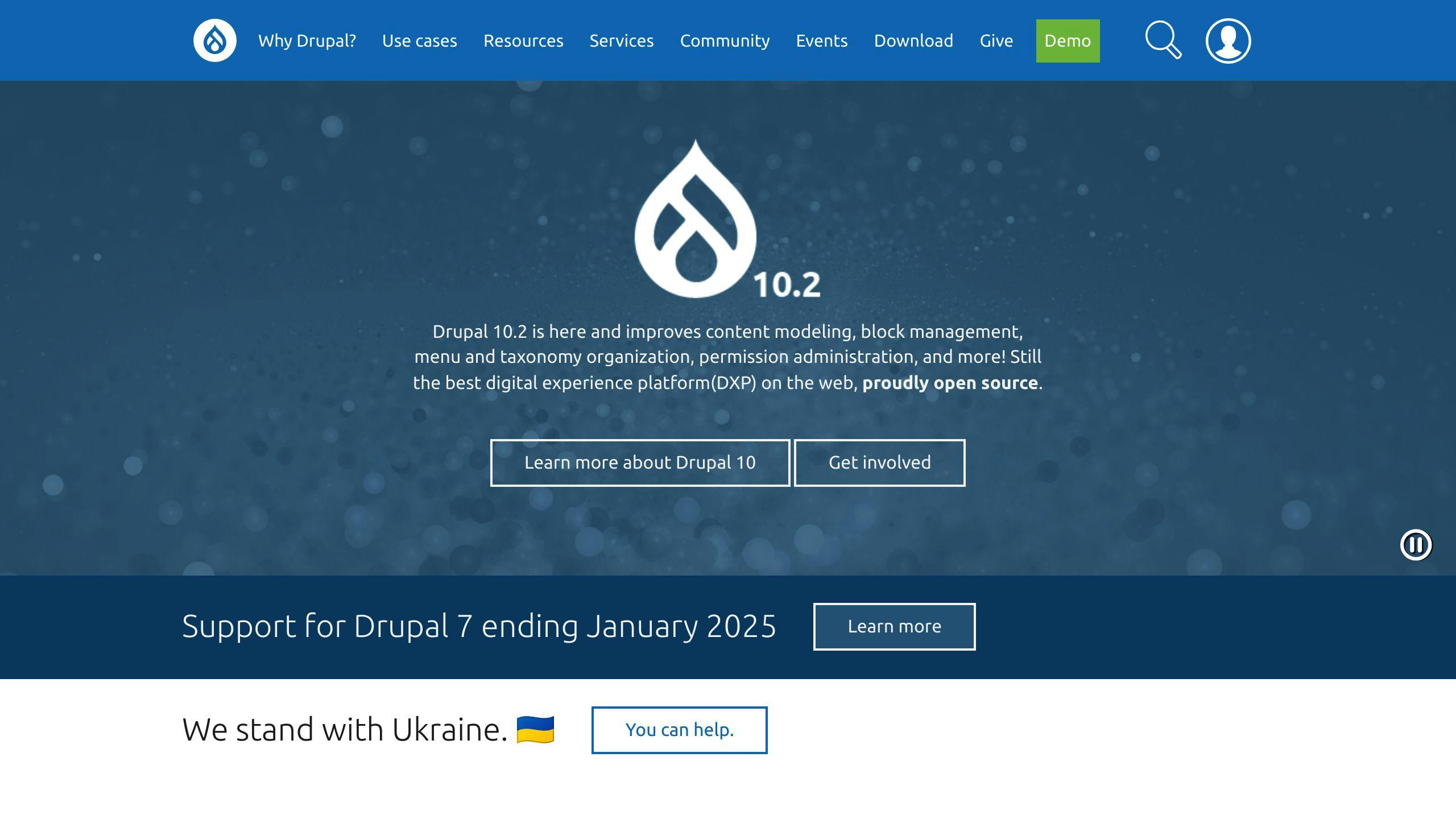
Drupal is a popular open-source Content Management System (CMS) that offers a range of SEO-friendly features, making it an ideal choice for businesses and individuals looking to improve their website's search engine ranking.
SEO Modules
Drupal has various SEO modules that can enhance your website's search engine optimization capabilities. These modules provide functionalities like metadata optimization, automatic generation of SEO-friendly URLs, XML sitemap generation, and more. Here are some popular SEO modules for Drupal:
| Module | Features |
|---|---|
| Pathauto | Automatically generates URL/path aliases for various kinds of content |
| Metatag | Allows you to automatically provide structured metadata, aka "metatags", about your website |
| Redirect | Allows you to redirect from old URLs to new URLs |
| Simple XML Sitemap | Creates a sitemap that conforms to the sitemaps.org specification |
| SEO Checklist | Provides a checklist of good Drupal SEO best practices |
Metadata Customization
Drupal allows you to customize your website's metadata, including:
- Title tags: Customize the title of your webpage
- Meta descriptions: Write a brief summary of your webpage
- Header tags: Organize your content with header tags (H1, H2, H3, etc.)
You can also add alt text to your images, making them more discoverable by search engines.
Page Load Speed
Drupal offers various caching plugins that can improve your website's loading speed, which is essential for both user experience and SEO. Here are some popular caching plugins for Drupal:
| Plugin | Features |
|---|---|
| Drupal Cache | Improves page load speed, reduces server load |
| Varnish Cache | Generates static HTML files, reduces server load |
Mobile Responsiveness
Drupal themes are generally mobile responsive, ensuring that your website performs well on various devices. Mobile-friendliness is a crucial ranking factor, and Drupal makes it easy to create a responsive website.
With its flexibility, customization options, and SEO-friendly features, Drupal is an excellent choice for businesses and individuals looking to improve their website's SEO.
3. HubSpot CMS
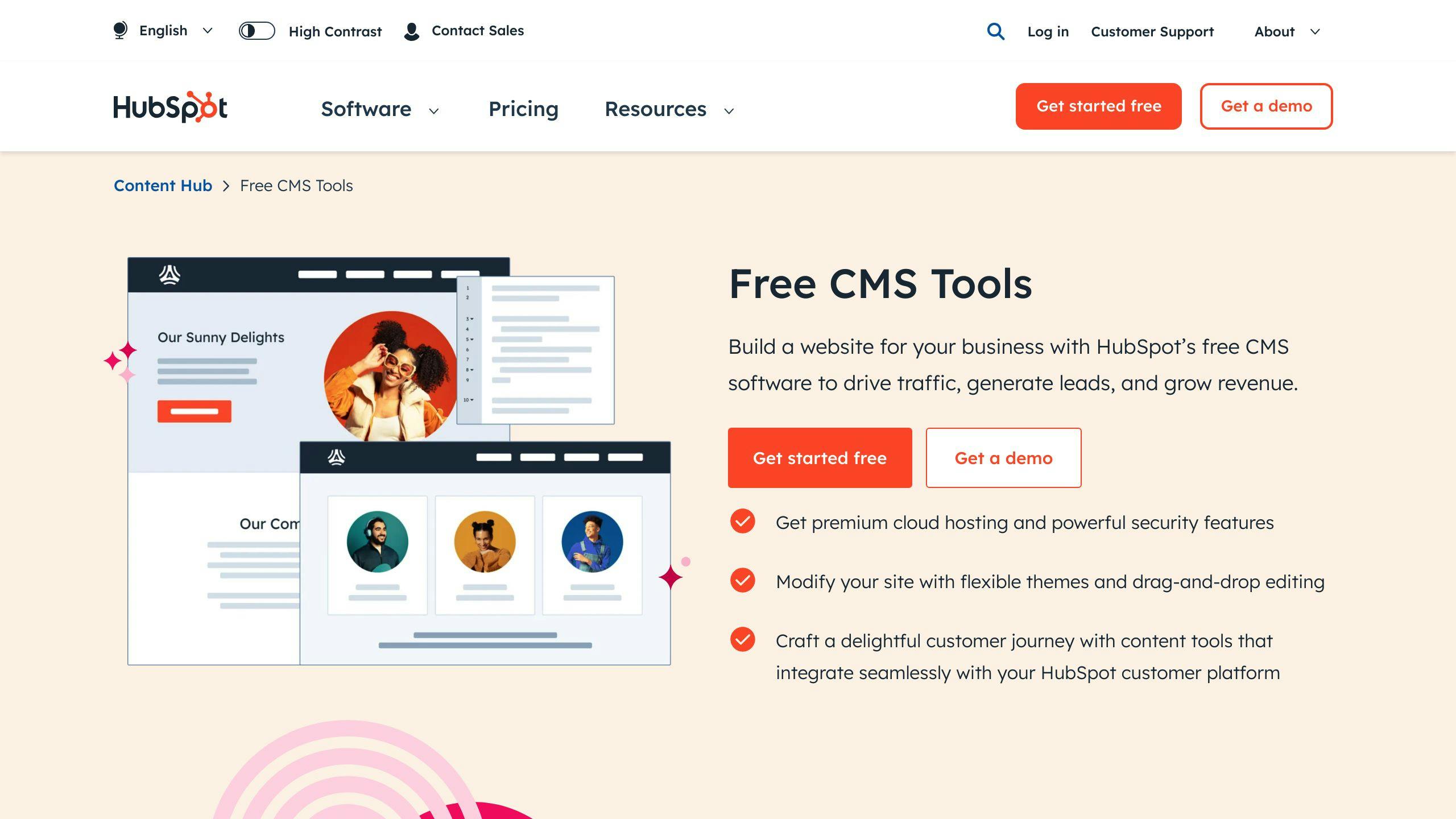
HubSpot CMS is a popular content management system that offers a range of SEO-friendly features, making it an ideal choice for businesses and individuals looking to improve their website's search engine ranking.
SEO Features
HubSpot CMS comes with built-in SEO tools that guide you in optimizing your content and strategies. These integrated tools make it easier to incorporate SEO best practices and track the performance of your content. Here are some of the SEO features:
| Feature | Description |
|---|---|
| On-page SEO recommendations | Get suggestions on how to optimize your page titles, meta descriptions, and header tags. |
| Content strategy tools | Plan and organize your content to target specific keywords and topics. |
| Analytics dashboard | Track your website's performance and make data-driven decisions to improve your SEO. |
Metadata Customization
HubSpot CMS allows you to customize your website's metadata, including:
- Title tags: Customize the title of your webpage.
- Meta descriptions: Write a brief summary of your webpage.
- Header tags: Organize your content with header tags (H1, H2, H3, etc.).
You can also add alt text to your images, making them more discoverable by search engines.
Page Load Speed
HubSpot CMS's infrastructure is designed for fast loading times and high performance, contributing positively to your SEO outcomes.
Mobile Responsiveness
HubSpot CMS provides a responsive design, configuring your content so it performs seamlessly across all devices.
With its built-in SEO tools, metadata customization options, fast page load speeds, and mobile responsiveness, HubSpot CMS is an excellent choice for businesses and individuals looking to improve their website's SEO.
4. Joomla
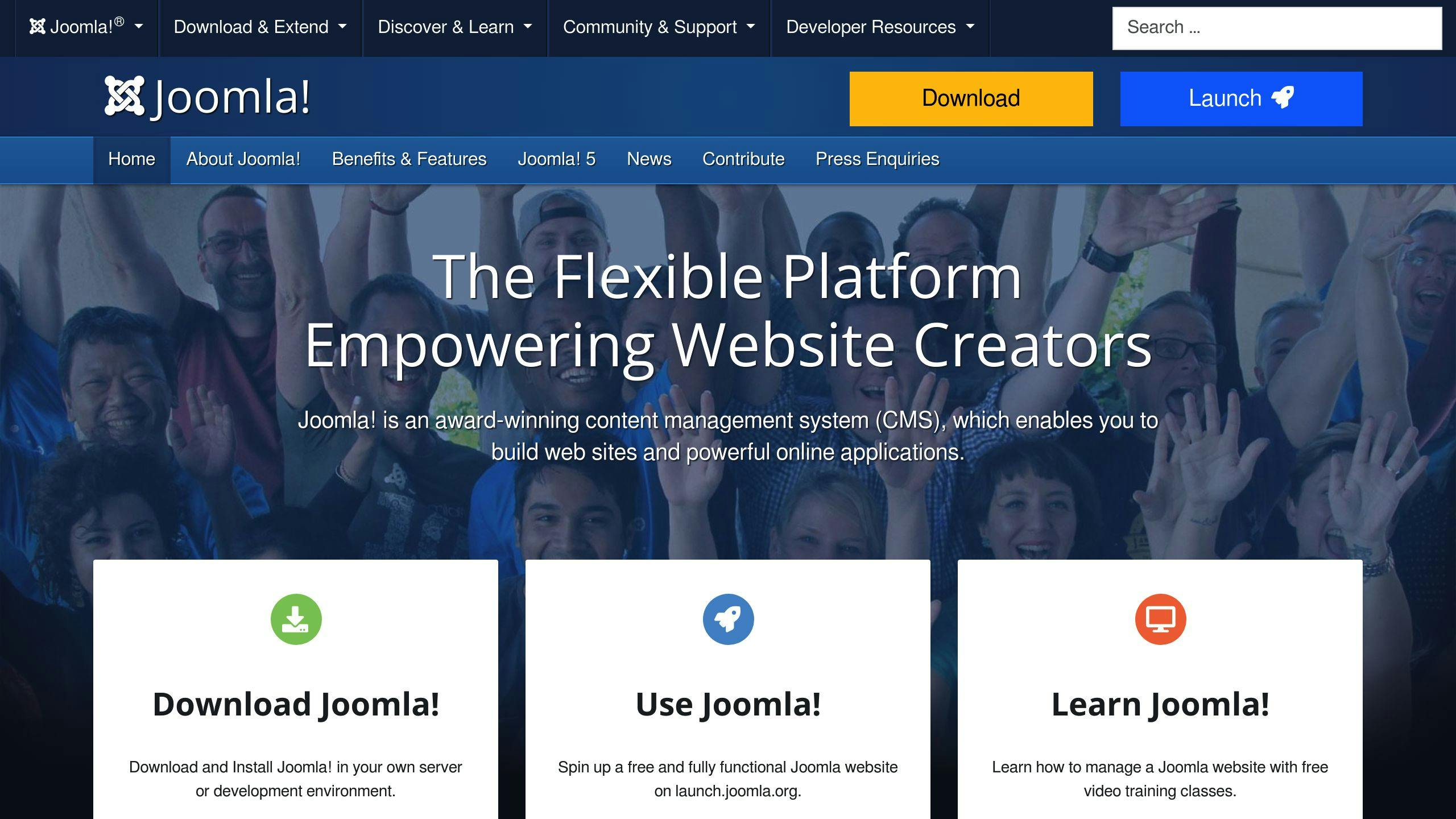
Joomla is a popular open-source content management system (CMS) that offers a range of features and extensions to improve website SEO. With its flexibility and scalability, Joomla is an ideal choice for businesses and individuals looking to boost their online presence.
SEO Extensions
Joomla has a vast array of SEO extensions that can be easily installed to enhance website optimization. Here are some popular SEO extensions:
| Extension | Features |
|---|---|
| SEO-Generator | Automatically generates page titles, meta descriptions, and keywords. |
| EFSEO – Easy Frontend SEO | Provides tools for optimizing page titles, meta descriptions, and heading tags. |
| RSSEO! | Offers features for managing SEO settings, generating XML sitemaps, and customizing robots.txt files. |
Customizing Metadata
Joomla allows you to customize your website's metadata, including:
- Title tags: Customize the title of your webpage.
- Meta descriptions: Write a brief summary of your webpage.
- Header tags: Organize your content with header tags (H1, H2, H3, etc.).
You can also add alt text to your images, making them more discoverable by search engines.
Page Load Speed
Joomla's infrastructure is designed for fast loading times, which is essential for SEO. You can further optimize page load speed by using caching plugins, compressing images, and minimizing HTTP requests.
Mobile Responsiveness
Joomla provides a responsive design, ensuring that your website performs seamlessly across all devices. This is crucial for SEO, as Google prioritizes mobile-friendly websites in its search engine rankings.
With its extensive range of SEO extensions, metadata customization options, fast page load speeds, and mobile responsiveness, Joomla is an excellent choice for businesses and individuals looking to improve their website's SEO.
5. Next.js
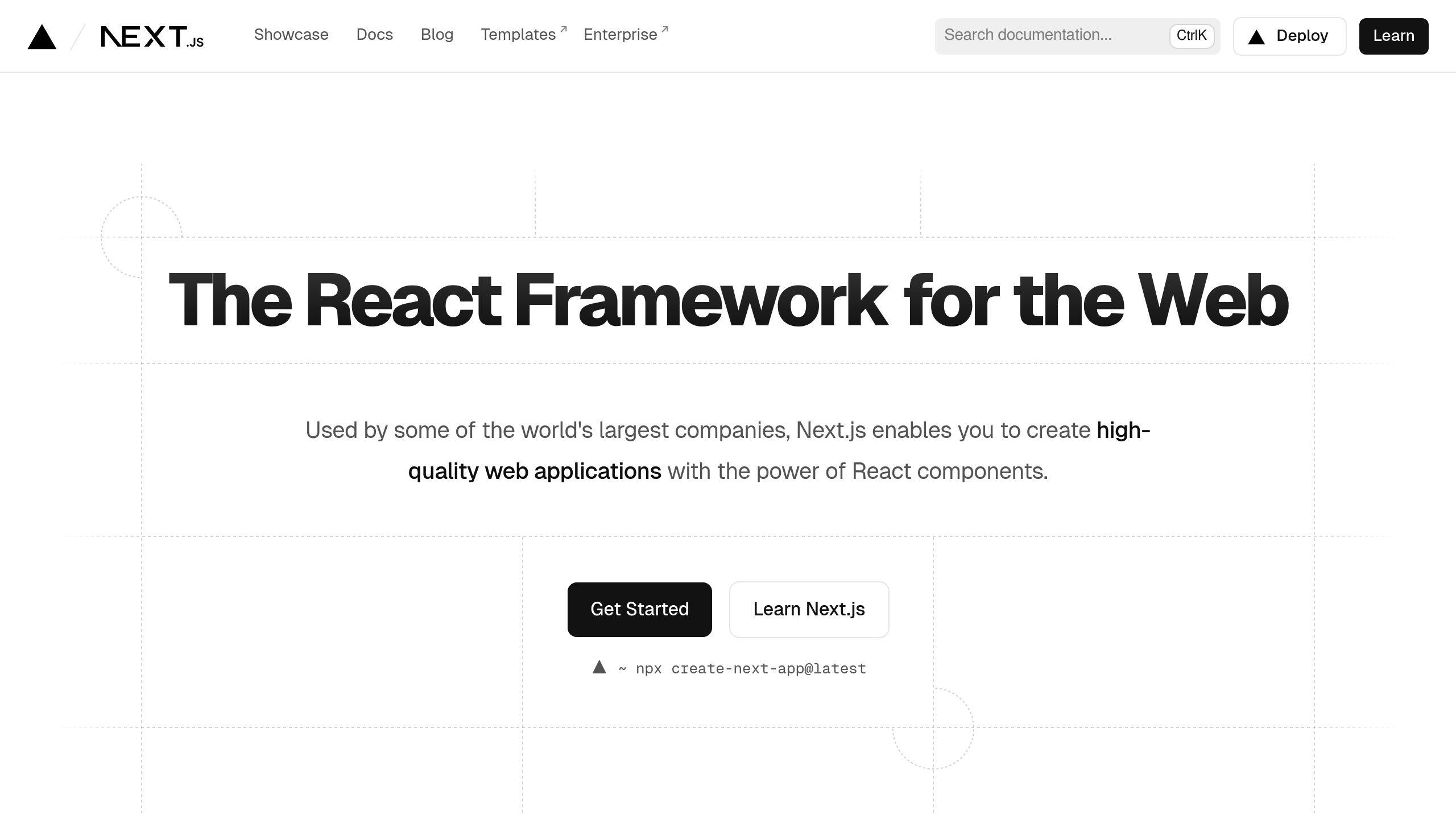
Next.js is a popular React-based framework for building server-side rendered (SSR) and statically generated websites and applications. Its built-in features and plugins make it an ideal choice for SEO optimization.
SEO Plugins and Apps
Next.js has a range of SEO plugins and apps that can be easily integrated to enhance website optimization. Here are some popular ones:
| Plugin/App | Features |
|---|---|
next-seo |
Metadata management, XML sitemap generation, robots.txt configuration |
next-sitemap |
XML sitemap generation |
next-robots |
Robots.txt configuration |
Metadata Customization
Next.js allows for easy metadata customization, including:
- Title tags: Customize the title of your webpage.
- Meta descriptions: Write a brief summary of your webpage.
- Header tags: Organize your content with header tags (H1, H2, H3, etc.).
You can also add alt text to your images, making them more discoverable by search engines.
Page Load Speed
Next.js is designed for fast page load speeds, which is essential for SEO. Its server-side rendering and static site generation capabilities ensure that pages load quickly, even for users with slow internet connections.
Mobile Responsiveness
Next.js provides a responsive design, ensuring that your website performs seamlessly across all devices. This is crucial for SEO, as Google prioritizes mobile-friendly websites in its search engine rankings.
With its built-in SEO features, plugins, and apps, Next.js is an excellent choice for businesses and individuals looking to improve their website's SEO.
6. Webflow
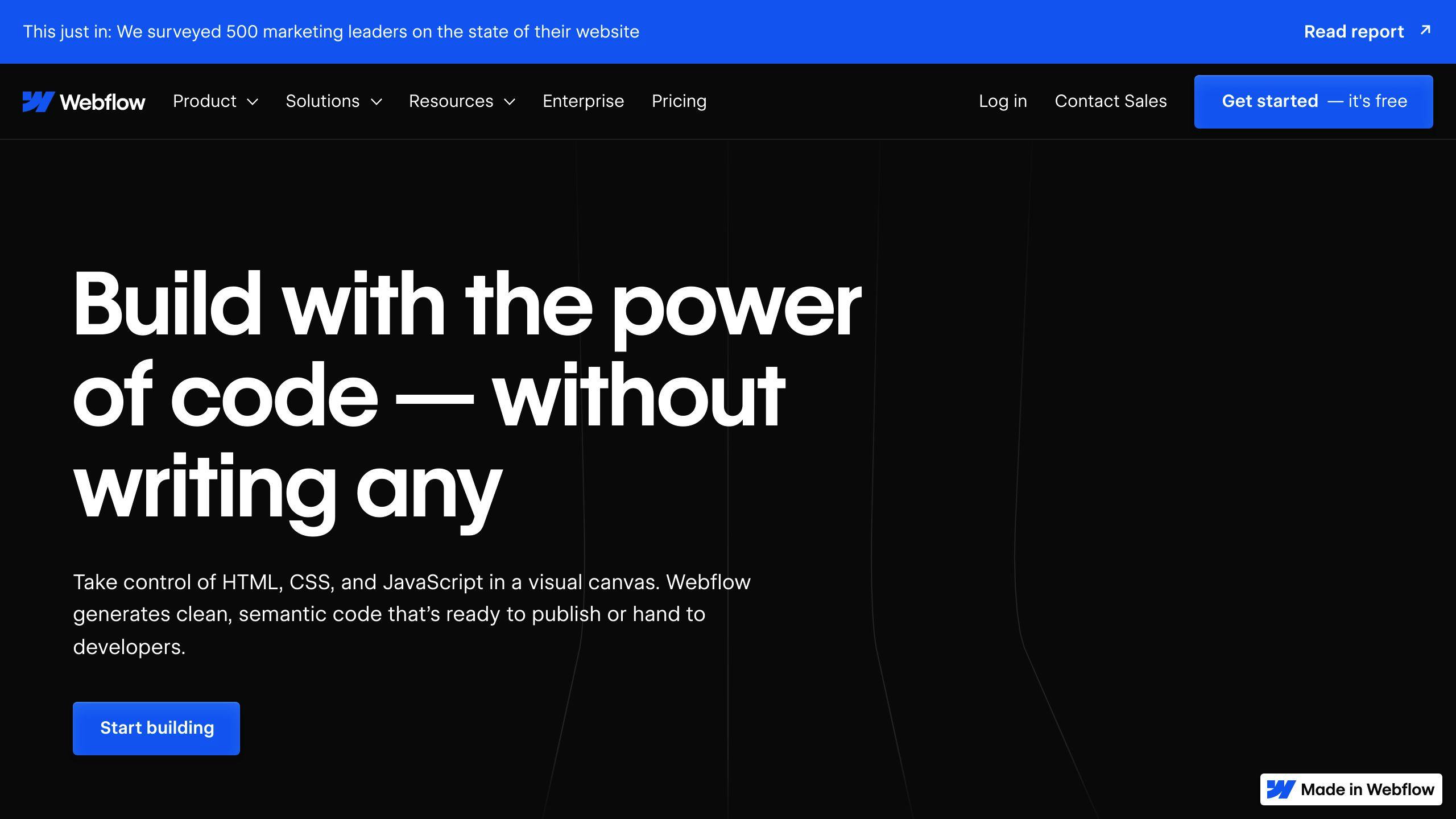
Webflow is a popular no-code website development and CMS tool that offers a range of features to improve SEO. With its intuitive visual editor and clean code, Webflow provides greater control over SEO elements, such as meta tags and structured data, while benefiting from faster loading times and a seamless user experience.
Metadata Customization
Webflow allows you to customize your website's metadata, including:
| Metadata | Description |
|---|---|
| Title tags | Customize the title of your webpage. |
| Meta descriptions | Write a brief summary of your webpage. |
| Header tags | Organize your content with header tags (H1, H2, H3, etc.). |
You can also add alt text to your images, making them more discoverable by search engines.
Page Load Speed
Webflow's globally-distributed, AWS-powered hosting stack ensures fast loading times, which is essential for SEO.
XML Sitemap Generation
Webflow offers automatic sitemap generation, which helps search engines find and crawl your website's pages more efficiently.
Analytics Integration
Webflow integrates with popular analytics tools, allowing you to track your website's performance and make data-driven decisions to improve your SEO.
With its built-in SEO features and intuitive editor, Webflow is an excellent choice for businesses and individuals looking to improve their website's SEO without relying on plugins or third-party tools.
sbb-itb-b8bc310
7. Wix

Wix is a popular content management system (CMS) that helps improve your website's search engine optimization (SEO). With its user-friendly interface and drag-and-drop editor, Wix makes it easy to create and optimize your website for search engines.
Customizing Metadata
Wix allows you to customize your website's metadata, including:
| Metadata | Description |
|---|---|
| Title tags | Customize the title of your webpage. |
| Meta descriptions | Write a brief summary of your webpage. |
| Header tags | Organize your content with header tags (H1, H2, H3, etc.). |
You can also add alt text to your images, making them more discoverable by search engines.
Fast Page Load Speed
Wix's automatic image optimization and content delivery network (CDN) integration ensure fast loading times, which is essential for SEO.
Mobile-Friendly Design
Wix websites are mobile-friendly, providing a better user experience and improving your website's SEO.
Internal Linking Tools
Wix offers internal linking tools, making it easy to create a clear site structure and help search engines crawl your website more efficiently.
Analytics Integration
Wix integrates with popular analytics tools, allowing you to track your website's performance and make data-driven decisions to improve your SEO.
With its built-in SEO features and user-friendly interface, Wix is an excellent choice for businesses and individuals looking to improve their website's SEO without relying on plugins or third-party tools.
8. Hygraph
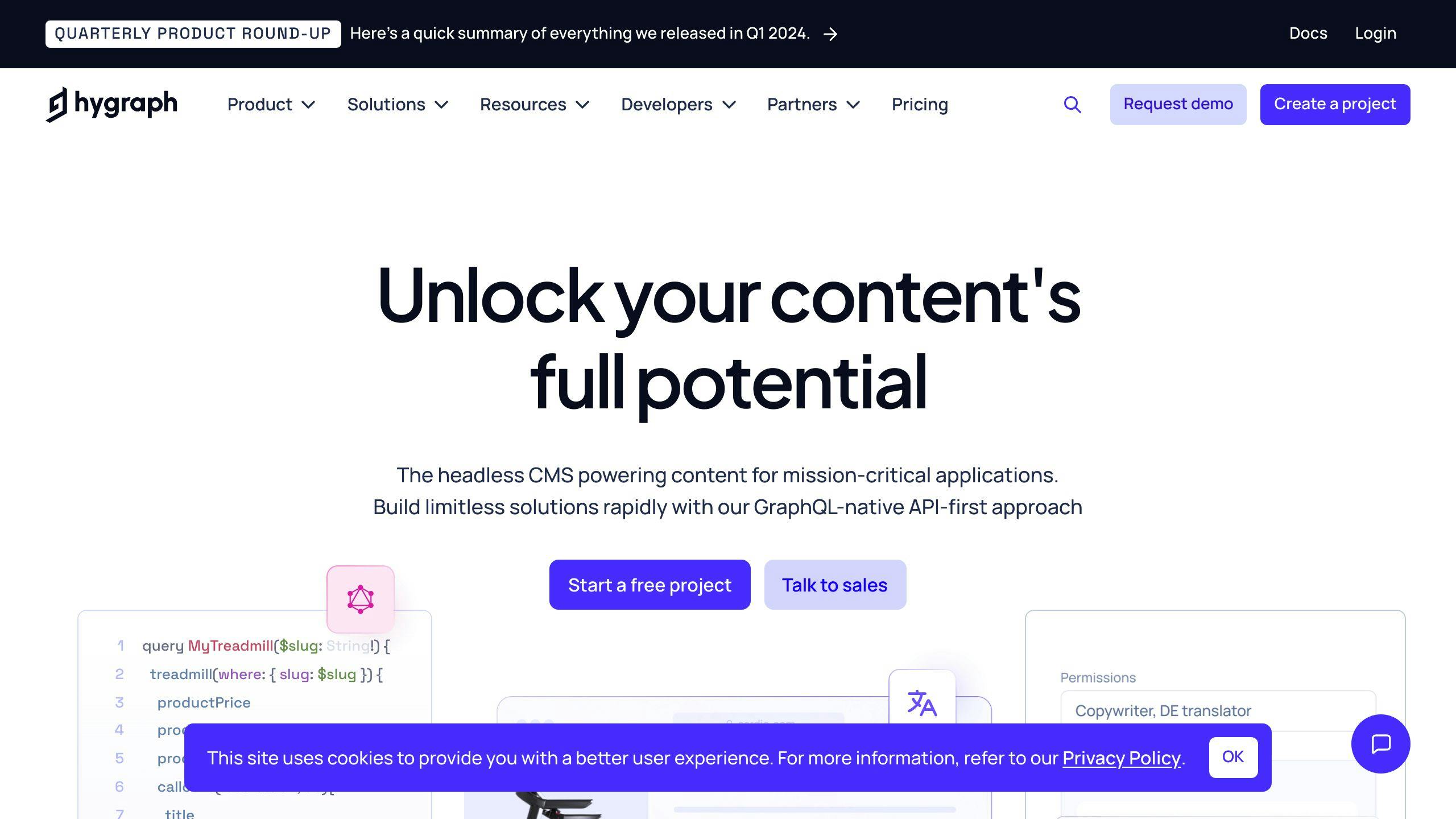
Hygraph is a headless Content Management System (CMS) that offers a flexible and scalable solution for managing content across multiple platforms. Its API-first approach allows developers to create custom applications and integrations, making it an ideal choice for businesses with complex content requirements.
Metadata Customization
Hygraph provides a robust metadata management system that allows you to customize your content's metadata, including:
| Metadata | Description |
|---|---|
| Title tags | Customize the title of your webpage. |
| Meta descriptions | Write a brief summary of your webpage. |
| Header tags | Organize your content with header tags (H1, H2, H3, etc.). |
You can also add alt text to your images, making them more discoverable by search engines.
Page Load Speed
Hygraph's content delivery network (CDN) and automatic image optimization ensure fast page load speeds, which is essential for SEO.
Mobile Responsiveness
Hygraph's headless architecture allows you to create mobile-friendly applications and websites, providing a better user experience and improving your website's SEO.
Internal Linking Tools
Hygraph provides internal linking tools that allow you to create a clear site structure and help search engines crawl your website more efficiently.
XML Sitemap Generation
Hygraph integrates with popular analytics tools, allowing you to track your website's performance and make data-driven decisions to improve your SEO. Additionally, Hygraph provides XML sitemap generation tools, making it easy to submit your sitemap to search engines and improve your website's visibility.
With its flexible architecture, robust metadata management, and fast page load speeds, Hygraph is an excellent choice for businesses looking to improve their website's SEO and provide a better user experience.
9. Shopify

Shopify is a popular ecommerce platform that offers built-in SEO features to help online stores improve their search engine rankings. With Shopify, you can create a mobile-friendly online store with a responsive design, which is essential for SEO.
SEO Plugins and Apps
Shopify has a range of SEO plugins and apps that can help you optimize your online store for search engines. Here are some popular SEO apps for Shopify:
| App | Features |
|---|---|
| Plugin SEO | Optimizes product pages, meta tags, and images |
| Smart SEO | Provides insights into technical SEO performance |
| Booster SEO & Image Optimizer | Optimizes images and provides SEO recommendations |
| Yoast | Offers SEO audits and optimization tools |
Metadata Customization
Shopify allows you to customize your metadata, including:
- Title tags: Customize the title of your webpage
- Meta descriptions: Write a brief summary of your webpage
- Header tags: Organize your content with header tags (H1, H2, H3, etc.)
You can also add alt text to your images, making them more discoverable by search engines.
Page Load Speed
Shopify's content delivery network (CDN) and automatic image optimization ensure fast page load speeds, which is essential for SEO.
Mobile Responsiveness
Shopify's responsive design ensures that your online store looks great on all devices, including mobile phones and tablets.
XML Sitemap Generation
Shopify integrates with popular analytics tools, allowing you to track your website's performance and make data-driven decisions to improve your SEO. Additionally, Shopify provides XML sitemap generation tools, making it easy to submit your sitemap to search engines and improve your website's visibility.
With its built-in SEO features, range of SEO plugins and apps, and fast page load speeds, Shopify is an excellent choice for ecommerce businesses looking to improve their website's SEO and provide a better user experience.
10. Storyblok
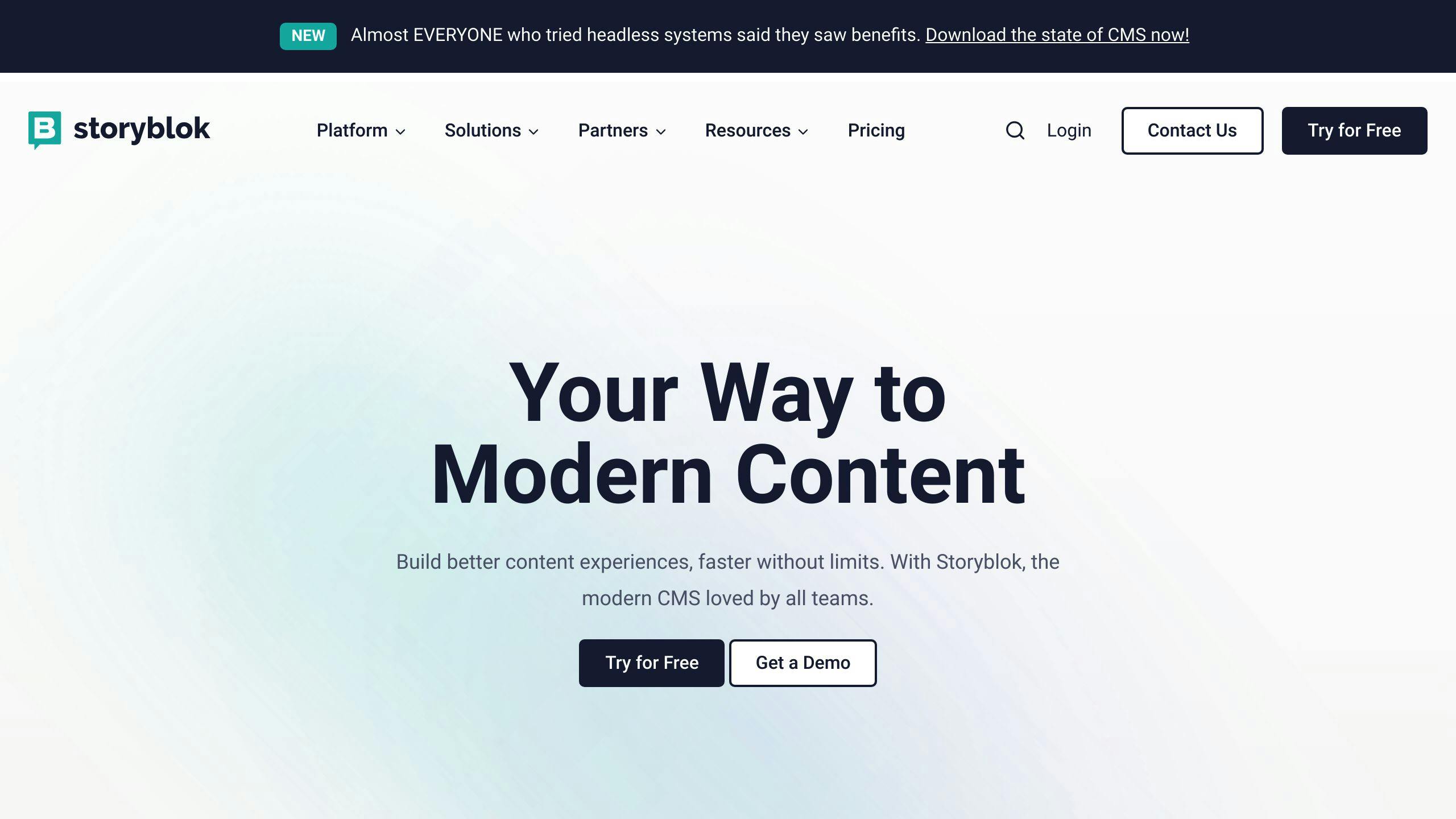
Storyblok is a headless Content Management System (CMS) that offers multiple SEO capabilities. With Storyblok, you can customize metadata and add more fields to fit all your SEO needs.
SEO App
Storyblok's SEO app helps you enhance your online presence with a refined SEO strategy. The app provides convenient metadata controls, enriching your toolkit with features designed to boost your website's visibility.
Image Service
Storyblok's image service provides high-quality images in different formats and sizes for all devices and platforms. This ensures that your website loads quickly and provides an excellent user experience.
Localization
Storyblok has built-in support for creating multilingual websites, improving your website's SEO across languages and regions. This feature allows you to reach a broader audience and increase your online visibility.
Page Load Speed
Storyblok's headless approach ensures a seamless mobile experience with faster loading times. This is essential for SEO, as page load speed is a critical ranking factor.
XML Sitemap Generation
Storyblok provides SEO-friendly content structures, including customizable metadata, user-friendly URL structures, and XML sitemaps. This helps to align your content with search engine algorithms and make it visually appealing.
With its native SEO app, image service, and localization features, Storyblok is an excellent choice for businesses looking to improve their website's SEO and provide a better user experience.
Pros and Cons of Each CMS
Here is a detailed comparison of the pros and cons of each CMS:
WordPress
| Pros | Cons |
|---|---|
| Many themes available | Requires plugins for full SEO features |
| Many plugins available | |
| Responsive design capabilities | |
| Large number of SEO features available |
Drupal
| Pros | Cons |
|---|---|
| Fast | Less user-friendly than other CMSs |
| User-friendly content organization | May need a developer to use |
| Mobile friendliness | Requires modules for full SEO features |
| Many templates available | |
| Many extensions available | |
| Large number of SEO features available |
HubSpot CMS
| Pros | Cons |
|---|---|
| Easy to use | Expensive at the enterprise level |
| Excellent insights | Works best as a full-service solution |
| Exclusive content creation and management feature | Templates are not very flexible |
Joomla
| Pros | Cons |
|---|---|
| Fast | Less user-friendly than other CMSs |
| User-friendly content organization | May need a developer to use |
| Mobile friendliness | Requires modules for full SEO features |
| Many templates available | |
| Many extensions available | |
| Large number of SEO features available |
Next.js
| Pros | Cons |
|---|---|
| Very fast | Fewer plugins than Gatsbyjs |
| Excellent user experience | Development and management can be challenging |
| SEO efficiency | Lack of a built-in state manager |
| Easy to deploy | |
| Community support | |
| Ability to use API routes |
When choosing a CMS, consider your specific needs and weigh the pros and cons of each option. While each CMS has its strengths and weaknesses, understanding the advantages and disadvantages of each can help you make an informed decision for your website or application.
Detailed CMS Comparison
In this section, we'll compare the features and capabilities of each CMS, highlighting their strengths and weaknesses in terms of SEO performance.
WordPress vs. Drupal
| Feature | WordPress | Drupal |
|---|---|---|
| Page Speed | Average (60-70) | Fast (80-90) |
| Mobile Friendliness | Excellent | Excellent |
| SEO Plugins | Yoast SEO, All in One SEO Pack | Drupal SEO, SEO Checklist |
| Customizable Page Elements | Yes | Yes |
| URL Canonicalization | Yes | Yes |
| XML Sitemap Generation | Yes | Yes |
| Analytics Integration | Yes | Yes |
Both WordPress and Drupal offer excellent SEO capabilities. WordPress's Yoast SEO plugin is a popular choice, while Drupal's speed and mobile friendliness give it an edge in technical SEO.
Next.js vs. Webflow
| Feature | Next.js | Webflow |
|---|---|---|
| Page Speed | Very Fast (90-100) | Fast (80-90) |
| Mobile Friendliness | Excellent | Excellent |
| SEO Efficiency | Excellent | Good |
| Customizable Page Elements | Yes | Yes |
| URL Canonicalization | Yes | Yes |
| XML Sitemap Generation | Yes | Yes |
| Analytics Integration | Yes | Yes |
Next.js and Webflow are both known for their speed and mobile friendliness, making them excellent choices for SEO-focused websites. Next.js's SEO efficiency is particularly impressive, with its ability to generate static HTML files that can be crawled and indexed by search engines.
Joomla vs. HubSpot CMS
| Feature | Joomla | HubSpot CMS |
|---|---|---|
| Page Speed | Average (60-70) | Fast (80-90) |
| Mobile Friendliness | Good | Excellent |
| SEO Plugins | Joomla SEO, SEO Pro | HubSpot SEO |
| Customizable Page Elements | Yes | Yes |
| URL Canonicalization | Yes | Yes |
| XML Sitemap Generation | Yes | Yes |
| Analytics Integration | Yes | Yes |
Joomla and HubSpot CMS are both solid choices for SEO, with Joomla's SEO plugins offering a range of features and HubSpot CMS's exclusive content creation and management feature making it an attractive option for businesses. However, HubSpot CMS's speed and mobile friendliness give it an edge in technical SEO.
Choosing the Right CMS for SEO
When selecting a Content Management System (CMS) for your website, it's crucial to consider the impact on your search engine optimization (SEO) efforts. With many options available, it's essential to choose a CMS that aligns with your SEO goals.
Key Considerations
When evaluating a CMS for SEO, consider the following factors:
| Factor | Description |
|---|---|
| Customizable page elements | Ability to customize meta titles, meta descriptions, header tags, and other page elements that impact SEO. |
| Mobile-friendliness | Ensure the CMS offers mobile-friendly design options, as this is a critical ranking factor. |
| SEO plugins and tools | Look for a CMS that offers built-in SEO plugins or integrations with third-party tools to help optimize your content. |
| Page speed and performance | Choose a CMS that prioritizes page speed and performance, as slow loading times can negatively impact SEO. |
| URL structure and canonicalization | Opt for a CMS that allows you to easily customize URL structures and canonicalize duplicate content. |
Weighing the Pros and Cons
Each CMS has its strengths and weaknesses when it comes to SEO. Carefully evaluating the pros and cons of each option, you can make an informed decision that meets your specific needs.
Here's a brief comparison of the CMS options discussed earlier:
| CMS | Pros | Cons |
|---|---|---|
| WordPress | Flexible, extensive plugin ecosystem | Requires technical expertise for SEO optimization |
| HubSpot CMS | Streamlined SEO experience, user-friendly | Limited customization options, expensive at the enterprise level |
| Drupal | Fast, mobile-friendly, extensive module ecosystem | Steeper learning curve, may require developer expertise |
| Joomla | Fast, mobile-friendly, extensive plugin ecosystem | Less user-friendly than other CMS options, may require developer expertise |
| Next.js | Very fast, excellent user experience, SEO efficiency | Fewer plugins than Gatsbyjs, development and management can be challenging |
| Webflow | Fast, mobile-friendly, excellent user experience | Limited customization options, may require developer expertise |
| Hygraph | Fast, mobile-friendly, excellent user experience, SEO efficiency | Limited customization options, may require developer expertise |
| Shopify | Fast, mobile-friendly, excellent user experience, SEO efficiency | Limited customization options, may require developer expertise |
| Storyblok | Fast, mobile-friendly, excellent user experience, SEO efficiency | Limited customization options, may require developer expertise |
| Wix | Fast, mobile-friendly, excellent user experience, SEO efficiency | Limited customization options, may require developer expertise |
Ultimately, the right CMS for SEO will depend on your specific needs, goals, and resources.
FAQs
Does CMS Matter for SEO?
The choice of Content Management System (CMS) does not directly impact website rankings. However, it indirectly affects content quality, user experience, and technical SEO, which are crucial for search engine rankings. Therefore, selecting a CMS with strong SEO capabilities, responsive design, and excellent performance is vital.
Here's why CMS matters for SEO:
| Reason | Description |
|---|---|
| Content Quality | A good CMS helps create high-quality, engaging content that resonates with users. |
| User Experience | A CMS with responsive design ensures a smooth user experience across devices, which is essential for SEO. |
| Technical SEO | A CMS with built-in SEO features, such as customizable page elements and mobile-friendliness, can improve technical SEO. |
